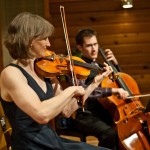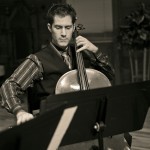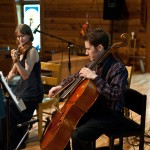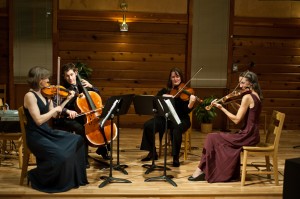 LA CAFAMORE AND THE REVOLUTIONARIES: La Cafamore String Quartet, Knox Presbyterian Church, Friday September 30th, 2011, 7:30
LA CAFAMORE AND THE REVOLUTIONARIES: La Cafamore String Quartet, Knox Presbyterian Church, Friday September 30th, 2011, 7:30
Modern, super cool, amplified music and String quartet are not part of any normal word association game or exercise. And yet, at the La Cafamore String Quartet concert on Friday all of these would have been in context.
The Cafamore String Quartet from the West Kootenays is in its fourth season as a performing group and is in the middle of concert tour of the Kootenays. The quartet consists of cellist Jeff Faragher from Nelson, violinist Carolyn Cameron from Rossland, violist Alexis Moore from Creston and violinist Angela Snyder from Front Royal, Virginia. The quartet promised a night of exciting, and adventurous music.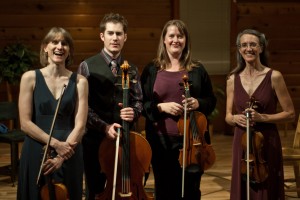
It may have been intentional that the music chosen was from some of the most revolutionary composers of the past (Beethoven, Debussy and Puccini) and the present generation (Steve Reich). Beethoven stepped out of the shadow of his predecessors Haydn and Mozart with innovations that herald the dawn of the Romantic era; Debussy perhaps the first of the modernist with his advances in complex harmony and Puccini best know for his operas. Steve Reich, though still very much alive and kicking, is largely unknown by the general public.
The quartet eased into the evening’s music with Beethoven’s String Quartet Op18, No.6. It was written around 1798 when he was about 30 years old and was beginning to wrestle with the onset of his deafness. The opening movements, as to be expected, are an extension of past musical practices of Haydn and Mozart and it only in the later movements that the music becomes distinctively his. Although revolutionary at the time, to modern ears all of Beethoven’s music now is somewhat familiar.
The next composition on the program, Steve Reich’s “Different Trains” may have required a significant intellectual and emotional leap for audiences unfamiliar with truly modern music. Steve Reich is a modern American minimalist composer who relies on short phrases that evolve, loop and interlock in complex melodic and rhythmic patterns. It is steps away from the increasing harmonic complexity of most modern music. “Different Trains”, the piece chosen for the evening’s performance, is a programmatic rumination by the composer on train journeys in the states and in Europe in 1939 through to about 1950. It is a reflection of the composer’s personal recollections and war time Jewish experiences.
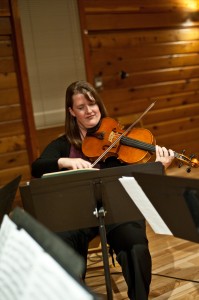 The next composition on the program, Steve Reich’s “Different Trains” may have required a significant intellectual and emotional leap for audiences unfamiliar with truly modern music. Steve Reich is a modern American minimalist composer who relies on short phrases that evolve, loop and interlock in complex melodic and rhythmic patterns. It is steps away from the increasing harmonic complexity of most modern music. “Different Trains”, the piece chosen for the evening’s performance, is a programmatic rumination by the composer on train journeys in the states and in Europe in 1939 through to about 1950. It is a reflection of the composer’s personal recollections and war time Jewish experiences.
The next composition on the program, Steve Reich’s “Different Trains” may have required a significant intellectual and emotional leap for audiences unfamiliar with truly modern music. Steve Reich is a modern American minimalist composer who relies on short phrases that evolve, loop and interlock in complex melodic and rhythmic patterns. It is steps away from the increasing harmonic complexity of most modern music. “Different Trains”, the piece chosen for the evening’s performance, is a programmatic rumination by the composer on train journeys in the states and in Europe in 1939 through to about 1950. It is a reflection of the composer’s personal recollections and war time Jewish experiences.
Now this is the super cool part. As usual the publisher sends the manuscript for the string quartet but along with it comes a CD of pre-recorded train sounds, snatches of speech and another string quartet playing the loops of music that are the core of the composition. In simplistic terms it is an interactive karaoke experience of the CD performance and the amplified La Cafamore String Quartet on stage. Overhead is displayed the text and the sequence of the music. “Different Trains” is a three movement work; “I: America – before the War”, “II: Europe – During the War”, “III: After the War”. For an audience who may be familiar with the 1988 recording by the Kronos Quartet to actually see and hear the piece in live performance is still a some what mind blowing experience.
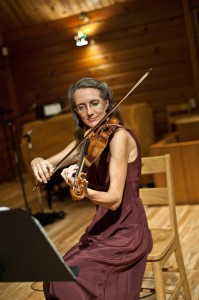 After the Steve Reich piece the remaining compositions in the program, Puccini’s “Crisantemi” and Debussy’s String Quartet in G Minor may have seemed a little anti-climatic. The Puccini piece may have come across as light weight while the Debussy, true to harmonic complexity of his language, could be construed as a relatively dense piece of music. Although some of the audience may have breathed a sigh of relief to be back in familiar territory. It is all a matter of perspective.
After the Steve Reich piece the remaining compositions in the program, Puccini’s “Crisantemi” and Debussy’s String Quartet in G Minor may have seemed a little anti-climatic. The Puccini piece may have come across as light weight while the Debussy, true to harmonic complexity of his language, could be construed as a relatively dense piece of music. Although some of the audience may have breathed a sigh of relief to be back in familiar territory. It is all a matter of perspective.
The La Cafamore String Quartet is to be commended on their adventurous programming and their willingness to travel through the East and West Kootenays to give performances. This was an exciting night of music and, perhaps, one of a series of future performances.
– Rod Wilson

